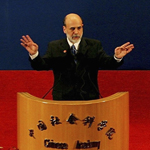
Former Federal Reserve Chairman Alan Greenspan signaled that the financial crisis has yet to end even as borrowing costs tumble, warning that U.S. banks must raise "large" amounts of money. "There is still a very large unfunded capital requirement in the commercial banking system in the United States and that's got to be funded," Greenspan said in an interview yesterday in Washington. He also said that "until the price of homes flattens out we still have a very serious potential mortgage crisis." Greenspan's comments suggest he sees a bigger capital shortfall in the banking system than reflected in regulators' stress tests on the 19 biggest U.S. lenders. Treasury Secretary Timothy Geithner told lawmakers yesterday that banks have issued more than $56 billion in new stock or debt since the tests found 10 firms needed to raise about $75 billion. A lack of capital at banks may inhibit lending to consumers and businesses, tempering any economic recovery. The former Fed chief, who left the central bank in 2006, said that the continued slump in home prices is putting at risk millions of borrowers. "We're on the edge and if this thing doesn't get resolved quickly I'm worried," he said before a meeting with House of Representatives members on financial regulation that was organized by the Washington-based Bipartisan Policy Center. Home prices will only start to stabilize once the "liquidation" rate of single-family homes has peaked, he said. "I don't think we're there yet." – Bloomberg
Dominant Social Theme: Much to worry about, much to do.
Free-Market Analysis: Sometimes it seems that the entire Western leadership has gathered on a single stage and with high kicks begun to chant, I see green shoots. Former Federal Reserve chairman Alan Greenspan has not entirely participated in this performance. He always struck us as someone who was cautious about telling a flat-out untruth, preferring to couch his perspectives in banker's speak. You could even glean a lot if you made the effort to unpack his language.
Unfortunately, Bloomberg can't really unpack what Greenspan is saying in the article excerpted above. To do so would take a free-market frame of reference, one not easily at hand within that organization's editorial toolbox. Thus, Greenspan's statements are taken at face value – and on their face are simple enough. Banks must continue to raise money because there is still a large "unfunded capital requirement." He sees a bigger capital shortfall and adds that "if this thing doesn't get resolved quickly I'm worried." Finally, he says home prices will only start to stabilize once "liquidation" has peaked.
We will unpack Greenspan-speak for you. The unfunded capital requirement he mentions is the amount of bad debt that banks still haven't cleared from their books. The amount of damage still hasn't peaked (he sees a bigger capital shortfall) and the system may freeze up if these loans aren't dealt with. ("If this thing doesn't get resolved quickly I'm worried.") Home prices won't be normalized until bad loans are written off.
See, Greenspan's remarks are grounded in free-market economics. Once a bubble has deflated, courtesy of central banking money stimulation, the mal-investment is exposed and must be dealt with. Greenspan is of the opinion that the banking establishment has not cleared away its mal-investments, has not cleared away its bad mortgage loans and may not do so. If time runs out, he fears another capital markets and banking crisis. We can think of several reasons why, of course. Sooner or later a wave of commercial mortgage, insurance and derivatives defaults are bound to smack the banking system. Maybe there are green shoots, but it will be hard to find them after deluge like that.

Greenspan, in our estimation, is in this instance providing a fairly reasonable assessment. If, at the height of a bubble, bad investments are made, then once the bubble has deflated those investments must be shut down and losses taken. If those loss-making investments are continually subsidized, then you end up with a Japanese-style scenario. Japan's consensus culture still hasn't unwound from its 1980s bubble. The way the leadership dealt with that painful unwinding was to subsidize banks and large financial entities, allowing them to continue to pour money into the loss-making outfits. This extended what would have been a sharp and painful contraction into a 20-year-plus malaise, complete with the brief spurts of optimism and continual, painful downward spikes. Based on what we see taking place in America, Britain and Europe, it is the Japanese scenario that may well play itself out. Greenspan seems to agree.
